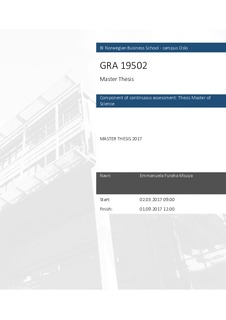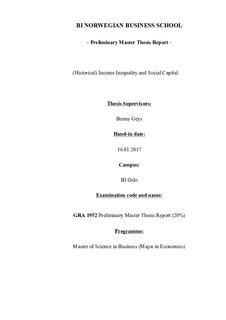| dc.contributor.author | Msuya, Emmanuela Furaha | |
| dc.date.accessioned | 2018-02-19T09:20:32Z | |
| dc.date.available | 2018-02-19T09:20:32Z | |
| dc.date.issued | 2017 | |
| dc.identifier.uri | http://hdl.handle.net/11250/2485562 | |
| dc.description | Masteroppgave(MSc) in Master of Science in Business, Economics - Handelshøyskolen BI, 2017 | nb_NO |
| dc.description.abstract | This master thesis examines whether – and, if so, how – income inequality has an
impact on social capital looking from a historical and present perspective.
After a brief literature review and a detailed theoretical discussion, my empirical
analysis uses municipality-level data and covers all 428 municipalities currently
existing in Norway. It covers the period from 1993 to 2015, but also incorporates
historical income inequality data from 1865. My main measure for social capital
is financial donations to the annual TV-aksjonen.
I implemented several empirical models, ranging from pooled OLS regressions
and fixed effects panel regressions on the complete set of data, to IV regression
models on pooled and municipality-averaged datasets. The latter approach was
particularly important since there was no over-time variation in the instrument
available to deal with potential endogeneity concerns in the relation between
inequality and social capital.
My main conclusion from using the sample of 428 municipalities is that an
increase in income inequality over time within a given municipality has little to no
effect/relation on how much people donate (Social Capital). | nb_NO |
| dc.language.iso | eng | nb_NO |
| dc.publisher | BI Norwegian Business School | nb_NO |
| dc.subject | samfunnsøkonomi | nb_NO |
| dc.subject | economics | nb_NO |
| dc.title | (Historical) Income inequality and social capital. | nb_NO |
| dc.type | Master thesis | nb_NO |

